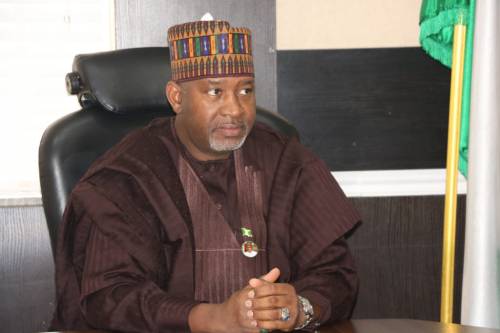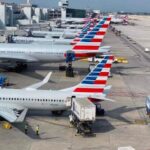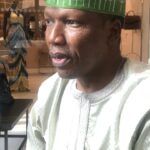
*Allays fears of private airlines over new national carrier
*Explains Nigeria’s suspension of Emirates Airlines
Despite the efforts the Asset Management Corporation of Nigeria (AMCON) has made so far to obtain an Air Operator Certificate (AOC) for its new airline, NG Eagle, the Minister of Aviation, Senator Hadi Sirika said the over N235 billion debt owed by the corporation may not allow the new start-up to be certified by the Nigerian Civil Aviation Authority of Nigeria (NCAA).
He has also allayed the fears of Nigerian airlines that the emergence of the national carrier would not guarantee a level-playing field in the way government relates with the operators.
Sirika also explained why Nigeria suspended Emirates Airlines before the United Arab Emirates (UAE) removed the Rapid Antigen Test (RDT) for Nigerian travellers at the weekend, prompting the federal government to also lift the ban on Emirates Airlines.
In an exclusive interview with THISDAY at the weekend, Sirika identified some of the debts to include AMCON’s N200 billion exposure to Arik Air and the airline’s N35 billion debts owed aviation agencies.
The minister said that NCAA would not likely give AOC to NG Eagle while these huge debts remained unresolved.
“Well, my understanding of AMCON is a company set up by the government. And I am also aware that AMCON is trying to set up another airline. How they are going to do it I do not know. But what I want to assure you is that the NCAA, which is the regulator, will ensure that everything that needs to be done to establish an airline, AMCON would have followed it.
“Anybody who wants to set up an airline today in the country, whether a state government or federal government or whatever, they want to set up an airline, they will go and set up an airline but NCAA will do the needful. I am not sure if AMCON intends to raise another airline out of Arik, because I do know AMCON itself has over N200 billion exposure in Arik. And I know also that Arik owes all the agencies of government in aviation, over N35 billion.
“So, I am not sure if a company that has a N235 billion deficit can start-up and become another airline. I am not too sure that can happen. So, I am not the regulator, I am the minister, but I don’t think that it will be possible for an airline to start with negative N235 billion,” the Minister told THISDAY.
Sirika also allayed the fears of Nigerian airlines that the emergence of the national carrier would not guarantee a level-playing field in the aviation sector.
The minister said that there would be no favouritism because the national carrier would operate as a private airline, just like the others.
He promised that there would no preferential treatment for the new national carrier.
“Well, as I said, this is a private sector-driven airline; the only difference between this Airline and Max Air or Azman, or Air Peace or any other, is the government is saying that, for the first time, we are going to set a framework. We are going to create an airline the way we think an airline should be run and driven. But 95 per cent of it is private sector-driven, so there is no favouritism here.
“There is a level-playing field and they are free also; if they like to either take part of their capital and invest in the new airline or compete with them. There is competition now between Air Peace and Ibom Air. I don’t think if you have your business plan right and you are doing it right, you should have any fear. In every single market, you go to today how many people are selling petroleum products in Nigeria? So, many and everybody is competing in the same market.
“NNPC as a government entity was also selling petroleum products, but that does not stop Total from selling their petroleum products. Neither did it stop Azman oil from selling their own. They sell gasoline; they sell diesel in the same market as NNPC and they are making a profit. So, I think it is dependent upon their planning their business and then they are getting it right. I don’t think there is any fear if the company is doing it right,” he explained.
Sirika also threw more light on why Nigeria suspended Emirates Airlines until the United Arab Emirates (UAE) removed the Rapid Antigen Test (RDT) for Nigerian travellers on Friday, prompting the federal government to also lift the ban on Emirates Airlines.
He said that every country adopted its COVID-19 protocol but some airlines, including Emirates, insisted on a different protocol from what Nigeria has for its citizens so the Nigerian government insisted on its policy.
“At the beginning of this COVID-19 challenge, every country puts its protocol on how to control the virus. We, as a country had our protocol. We put our protocol in place, but Emirates, Lufthansa, Air France, and KLM, decided not to observe the protocols put by Nigeria. And it was decided by the Presidential Steering Committee (PSC) to suspend these airlines.
“So, it wasn’t Aviation Ministry that suspended these airlines, it was PSC because they have flouted our rules governing COVID-19. Once that was done, Lufthansa, Air France-KLM, withdrew their position and toed the line of Nigeria and Emirates refused. Instead, Emirates introduced new rules that did not make scientific sense to us.
“For example, we do know that this virus once it catches your body, it takes four days to incubate and begin to show in your system. So, which means that if you have the virus today, up to four days when you test you will show negative. But from four to 14 days, you are likely to show positive. So, they put a protocol that if you are going to UAE, you should test yourself 48 hours before the flight, test yourself at the airport before departure within 48 hours. And then you fly seven hours to Dubai and test yourself.
“And go to your hotel or residence and test yourself. So, we thought that if you have negative 48 hours before and you have been negative before you board, you are certainly going to show negatively as you land. So, we thought that that was a commercial decision because they will be causing Nigerian passengers to be paying $200 per test, times four within two days,” the minister said.
He said that PSC did not see the wisdom in that decision, adding that despite the pressures from Nigerians who travel to Dubai or are resident in Dubai, the Presidential Ministerial Committee insisted that the position of Nigeria on COVID-19 protocol must be adhered to.
“Nigerians were so eager to travel to Dubai and we feel their pains. Some of them were traveling back to their jobs. Some of them were travelling for school, some for a medical reason, some even for leisure, which is allowed. But we thought that this is unfair treatment and this measure was only applied to Nigeria.
They singled out Nigeria; they discriminated against Nigeria. So, discriminating against a country was not acceptable to us. They cannot discriminate against 200 million people. And they cannot have their rules country-specific to be specific to Nigeria.

“If they had applied it to our region and their reason was that there were fake covid-19 results from Nigeria, but there were also fake results in Germany, in UAE, in France, in England, in the UK, US and everywhere. So, that was not a reason and if the reason was that they were afraid that we would come and infect passengers, we would say that we have managed COVID-19 extremely very well in Nigeria. Until today the death is below 3000. So, when we put that across to them, they said no, because we were not testing. Well, even if it is so that we were not testing, we were also not seeing people go into graves in Nigeria unexplained, unusually dying. And we know that in one day, 3,000 people were dying in Italy and France, and UK. And when they opened their borders in Dubai, we saw how many people were dying per day.
“But in Nigeria from the beginning of COVID-19 till date, we are still under 3,000. So, we refused. But because of pressure from people to open, we said to Emirates ‘, okay we agree, come and test us a million times, we are ready.’ You should come and test if you want to test 20 times a day do so, we are ready, let’s start. Then they said, okay, we will start but you must fly Emirates. If you fly Ethiopia or you fly Qatar or fly Turkish or you fly EgyptAir or British Airways, you must remain 14 days in the country you are transiting through. So, if you tell a Nigerian that he must stay 14 days in Addis Ababa or 14 days in Cairo before you can proceed to Dubai, does he have the visa for that country? Or does he even have the money to pay for a hotel and feeding? And some people are only going there for a 10-day trip. On the 10-day trip, you have already spent 14 days in another country. And this is also country-specific. This is also discriminatory; so, we refused,” Sirika explained.






